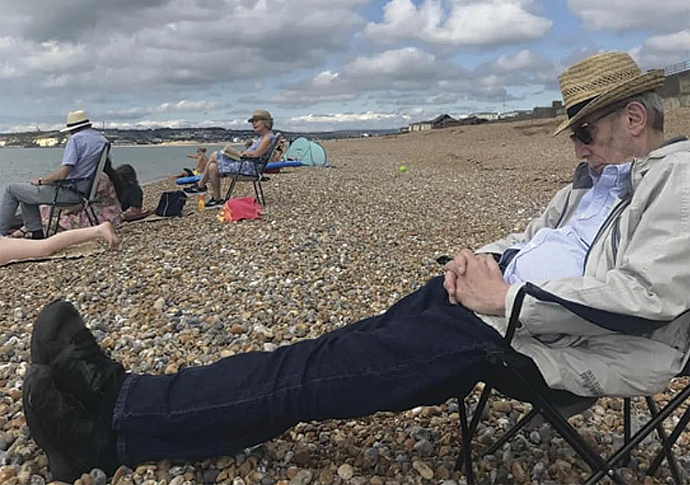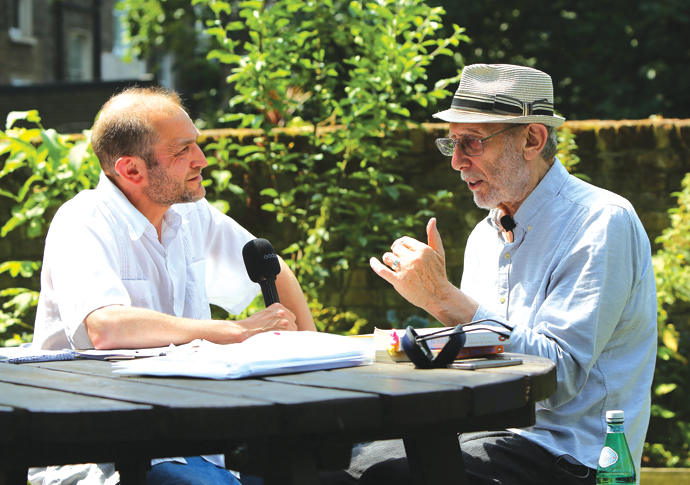The X factor
Michael Rosen’s latest collection of poems comprise a year’s worth of tweeted verses. He tells Dan Carrier how they were inspired by a trip to the beach...
Thursday, 4th July 2024 — By Dan Carrier

From the cover of the book, the snapshot that started it
THE social media site X, formerly Twitter, is often considered divisive. Owned by controversial multi-billionaire Elon Musk, the global noticeboard allows people to share their proclamations.
X users say on the one hand it’s a mixture of charming films and helpful information, and on the other vile abuse, misinformation and lies, and footage no one needs to see.
For poet Michael Rosen, the site has provided a place of discussion, a place to share thoughts – and sometimes a place to duck back under the parapet. But it is also a place for to him to hone and share his craft, and his new book, Pebbles, is made up entirely of a year’s worth of thoughts expressed on social media. The idea came to him while on a seaside jaunt.
“I was sitting on the beach and I fell asleep,” he recalls. “My wife had a camera and she snapped me falling asleep – she always finds it funny when I do that when I’m not really meant to. She looked at it and said: ‘That would make a nice cover for one of your books.’”
It was thinking about the individual pebbles that prompted the collection.
“The thing about a pebble beach is each one is single, a separate piece of pebble, but when viewed collectively they make a beach. That was what I was trying to do – it worked as an analogy. With a stream of consciousness you cannot pick each out. I wanted to think of each one, each poem, as a pebble and then when put together it would be whole.”
His new collection shows a nicer side of the social media world. He cited the early 20th-century trends – epitomised by James Joyce and Virginia Woolf – as to how X could offer a platform for an interior monologue to flow in short, sharp bursts.
“Go back to 1920s and 1920s. Writers started experimenting with a stream of consciousness, a kind of flow.
“Think of Molly Bloom’s monologue in Ulysses or Wolfe in To The Lighthouse. You are in a person’s mind and it was wonderful – it freed up writing.
“And with tweets, there is another way to represent our thoughts, in these little bursts we have. It could be something we have just seen, a burst of what we have hear, a burst of what we have remembered, or a burst of something we might imagine. This is another way of capturing something, a series of thoughts, one after another, but it is in fragments.”
He accepts Twitter can leave much to desire.

Michael Rosen talks to Dan Carrier
“There are a lot of people who use Twitter in an anonymous way and you can call anybody something and can tell lies – even if you do not know them to be, and get into abusive slanging matches,” he says.
“But on the other hand, it is fantastic platform to share information. There cannot be a blanket judgement about it as a site. Some people do get a lot of fun out of abusing people, which is not very nice at all.”
Michael says the use of suggestion in literature is as old as the hills.
“If you go back to Shakespeare you can see how you dart from one thing to the next, and how you are asked to make the connection,” he says.
“In Macbeth, he says tomorrow, tomorrow, tomorrow, and he says out, out, and blows out a candle. What he is saying is that’s what life is like.
“But he doesn’t say my life is like a candle, and I am going to blow it out, and now I am dead. Our minds do that leaping. It’s quite nice when writers explain everything but it’s also very nice when it is left for you. You feel it. You think: ‘Oh, yeah, I get it.’
“I want people to make their own connections.”
And the limited number of characters – X allows only 280 letters – offers further interest.
“Any poetic form, or indeed any literary form, is both freeing and constraining.
“Sometimes it can be quite liberating. There may be lots of things to say but if you can get to the essence, the core of it, it can be freeing. That might be the way of communicating great thoughts and points.
“And a sonnet, a ballad, a haiku – all these forms are both freeing and constraining and so are very nice to play with. It starts making you think. You work within the constraint – maybe the shape and pattern is a better way of putting it. It kind of clips your wings sometimes but there is no harm in that.”
The book ranges over everything from life, death and grief through to his disappointment of finishing a jar of pickled garlic.
“I tried to write one every day, a year in tweets, a year of thoughts, reflections, imaginings, sights, hearings, it was quite conscious and then I laid them out as a free verse poem,” he says.
Looking back, he realises the tweets are a handy memory aid.
“I remember where I am when I write,” he says.
“And I like that idea of grabbing the spontaneous moment of happening or thought – that is what DH Lawrence said he wanted to do, be spontaneous and grab it while it happens.
“With poetry you cannot usually do wild zig zagging. This way you can do exactly that – your tweets zig or zag anyway they wish.”
Having recovered from being in a Covid-related coma, Michael says he has a renewed sense of what it means to be alive – and he pours that into his poems.
“My daughter said to me: ‘You know what dad, you’re an optimistic nihilist. You’re a nihilist because you do not believe in God, you do not believe in some form of outside deity, and you don’t like it when people start talking about astrology and all that, but you are very optimistic about it, you want to make the most of every day.’ I am happy with that.”
• Pebbles: Poetry Tweets. By Michael Rosen, Smokestack Books, £8.99